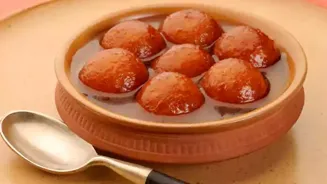The Indian subcontinent was subjected to frequent attacks from neighbouring nations, and as a result of this, foreign delicacies came in and settled here.
Given the rich history of our country, it is only natural for all our food to be not of Indian origin. Today, these delicacies so well mesh with the Indian culture that Westerners believe that the samosa is Indian. Here is a list of beverages and dishes that you will be surprised to learn that did not originate in India; but have wonderfully acclimated as per the Indian palette, flavor, and taste.
Samosa
The crunchy snack with hot potato filling is every Indian’s favorite evening snack. But this popular tea-time snack originated in the Middle East before the 10th century and migrated to India during the 14th century and has turned itself into a staple delicacy. It was originally known as ‘samosa’s and was introduced to Indians by the Central Asian traders.

Gulab Jamun
Those sweet and soft dumplings filled with saffron, sugar syrup, and cardamom are actually Persian. The name ascribed to this sweet also has its origins in the Persian language. The Persian gulab jamun was prepared by soaking khoya in honey syrup and drizzling it with sugar. So while gulab jamun is enjoyed during every quintessential Indian festival like Diwali, note that this sweet dish is not native.
Rajma
The North Indians may feel attacked for this! And why shouldn’t they? Rajma-chawal is that one staple delicacy that the entire North India prides itself on. This dish was brought to India by the Portuguese, and later the Mexicans began soaking and boiling the kidney beans. However, we have certainly created our version with thick gravy prepared with garlic, chopped onions, tomatoes, and spices.
Filter Coffee
The popular ‘kaaphi’ of South India is not even Indian. This benign and hot sleep-jerking beverage has its origin in the Yemen region. It is believed filter coffee was introduced by a Sufi saint named Baba Budan, who discovered it on his way to Mecca for pilgrimage. The saint had brought back seven beans of coffee from Mocha, Yemen, to India.
Jalebi
Our popular street dessert, jalebi, is actually from the Middle East. Originally known as the ‘zalibiya’ in Persian or ‘zalabiya’ in Arabic is not native to India; it has been borrowed and very skillfully modified.

Irrespective of the origins of the above dishes, these delicacies have been so well co-opted and modified that they have become quintessentially Indian.













